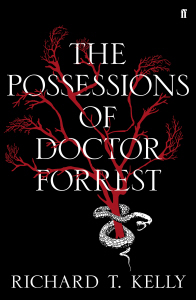Tag Archives: yukio mishima
33. Yukio Mishima, ‘the green snake’, and The Possessions of Doctor Forrest
I daresay the ‘snake’ element of Doctor Forrest – which extends from the novel’s front-cover, through an evil-looking tattoo on Robert Forrest’s bicep, to a bracelet that bears a charm of the medical symbol of the Asclepius – was also somewhat inspired by Mishima. Sometimes, to paraphrase Dr Freud, a snake is just a snake. But more commonly and problematically a snake tends to be a thousand other things, sometimes simultaneously. The serpent is the symbol to end all symbols, is it not?
Towards the end of his life Mishima was wont to refer to the uroborus, the ancient occult symbol of the serpent coiled around the Earth and devouring its own tail, ‘a ring vaster than death’, ‘vanquishing all polarities.’ Is this the same reptile that seems to haunt The Temple of Dawn, volume III of The Sea of Fertility? One does get that feeling.
A few months before his suicide in November 1970 Mishima told his English biographer Henry Scott Stokes that Japan, beset by money and materialism and ‘ugliness’, was under the curse of ‘the green snake.’ (One can imagine Mishima saying it in his excellent if inflected English: ‘green’ sounding like two syllables, ‘snake’ with a slight sibilance.) Scott Stokes was evidently troubled by Mishima’s language, and for all that Mishima was a considerable showman with a devotion to provoking nervous laughter, it seems fair to assume – since he was dead within a matter of weeks – that this cosmic despair was unfeigned.
You can hear him for yourself in these clips.
Filed under Uncategorized
2. Baudelaire’s satanic majesty
I was first guided to Baudelaire by good literary influence – not poetry but fiction, ‘Black Venus’ by Angela Carter, the title-story of a volume of tales by her, this one about Jeanne Duval, Baudelaire’s shady muse. (My feelings on learning the edgier elements of Baudelaire’s biography were akin to those recently voiced in respect of his own discoveries by the poet David Harsent in the Guardian: “I was rather taken with the fact that being a poet could also involve having a mulatto mistress and catching the clap…”) Around that time I also picked up on the legend that Baudelaire was a huge admirer of Edgar Allan Poe, and not just the famous ‘Tales of Mystery and Imagination’ but also the poetry, which was rumoured to offer a new frisson in French.
I imagine young readers will always seek out Baudelaire in search of what is, in great-poetry terms, the red meat of sensation. His work has a luxurious, alluring darkness and corruption. George Steiner once wrote of Dostoyevsky that by contrast with Tolstoy’s Olympian vitality he was ‘the sum of energies charged with illness and possession.’ That fits Baudelaire too.
To me the finest re-statement of the Baudelairean aesthetic is put in the mouth of Madame de Sade berating her mother in the 1965 play by Yukio Mishima: ‘You and your kind when you see a rose say ‘How pretty!’ And when you see a snake you say ‘How disgusting!’ You know nothing of the world where the rose and the snake are intimates and at night exchange shapes, the snake’s cheeks turning red and the rose putting forth shining scales…’
More of Mishima and snakes to come, watch this space. Meantime, this is probably my favourite poem of Baudelaire’s, and it is also much admired by Dr Robert Forrest.
Le Revenant
Comme les anges à l’oeil fauve,
Je reviendrai dans ton alcôve
Et vers toi glisserai sans bruit
Avec les ombres de la nuit;
Et je te donnerai, ma brune,
Des baisers froids comme la lune
Et des caresses de serpent
Autour d’une fosse rampant.
Quand viendra le matin livide,
Tu trouveras ma place vide,
Où jusqu’au soir il fera froid.
Comme d’autres par la tendresse,
Sur ta vie et sur ta jeunesse,
Moi, je veux régner par l’effroi.
Lastly, for audio-visual pleasure, here is Diamanda Galas’s performance of CB’s Litanies de Satan. Don’t play it if you’re alone and the house is dark, for it does rather carry Hell in its wake…
Filed under Uncategorized




